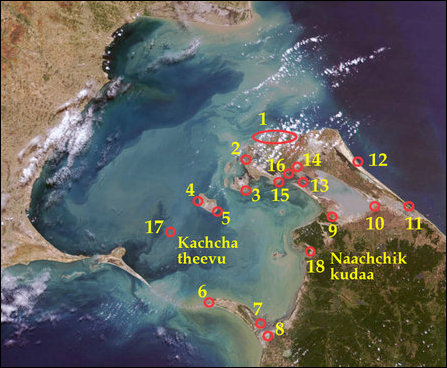[TamilNet, Wednesday, 11 April 2012, 03:59 GMT]
“Sri Lanka's desire to stamp out separatism is more than understandable, it is welcome,” even though its approach results in “undesirable, though unintended, side effects,” said The Hindu’s Business Line, Monday. Debating whether or not Indian vote at UNHRC would end ethnic discrimination achieves nothing. The key take away is that there is at least a perception of ethnic discrimination. “The [SL] government seems to be diverting all its energy and resources to economic development. This, from India's perspective, is great, because 20 million prosperous people in the neighbourhood is a big market for India […] There is only way for India to make use of Sri Lanka's economic development and also exert influence over it to end any ethnic discrimination” the feature said ignoring the gravity of genocide committed with Indian complicity and the on-going structural genocide in full swing.
“Luckily India's critical vote against Sri Lanka does not appear to have caused any major damage. Sri Lankans understand India's political compulsions […] And even then India did bring down the stridency of the tone of the resolution — which has been well appreciated in Sri Lanka. So, no major damage,” a sigh of relief over a successful deception committed on Tamils could be seen in The Hindu feature written by M. Ramesh.
The feature, painting a picture of promising understanding between the two partners through a conversation with a Sri Lankan diplomat, and implying the difficulties in achieving ‘devolution’ from a triumphalist state, was arguing in favour of consenting to even less than that of the provisions of the 1987 Indo-Lanka Agreement rejected by Eezham Tamils.
“Some demands, such as the merger of North and East may be difficult, but there are enough low hanging fruits waiting to be plucked,” the feature said.

Partnership of India and Sri Lanka in promoting Colombo-centric Railway network of the island [Photo courtesy: The Hindu]
“India has a good head start and it needs to capitalise on it,” the feature urged listing out the “mind boggling” Indian investment in the island and boasting that while China is rising in Sri Lanka, India has everything going to arrest its influence. The feature wanted fast-track removal of impediments for Sri Lanka to open up more for Indian trade.
The list of major Indian investments brought out by The Hindu feature included Tata Communications, Renuka Sugars, Ultratech cement and hoteliers besides state-owned Indian Oil Corporation, Indian Railways and thermal power project.
More than understanding the ‘compulsions’, which India tries to evade by hoodwinking its own people in Tamil Nadu, Sri Lanka for ages has a perfect understanding of all the weaknesses of the ruling forces of the Indian Establishment, commented a political activist in Jaffna.
While The Hindu feature softly argues against “unintended” side effects of Sri Lanka’s approach to the ‘ethnic’ issue, to what extent India building business over genocide of Eezham Tamils is going to help it in the long run, the activist asked, reminding that the Sinhalese by nature would never trust India and the Eezham Tamils–once considered the natural allies–too have come to the point after two wars of Indian participation ending up in the annihilation of their nation.
The Sinhala state diverts all its energy and resources not to ‘economic’ development, but to irreversible annihilation and subjugation of the nation of Eezham Tamils, and to permanently militarize the coasts of North and East to check India, which it sees as pre-requisites to its own development, security and hegemony.
The primary weakness of India as well as the USA, thinking of strategic benefits of the island as a whole and the market of 20 million ‘prosperous’ people, lies in not recognizing the genocide, militarization and colonization, not recognizing the realities of the aspirations of the Sinhala nation aiming an exclusive state for itself that whatever the solution within a united island it will always try to make the entire island to comply with its aspirations, and in not recognizing at least the right to protection, remedial sovereignty and right to self-determination of the genocide-affected Eezham Tamils, the political activist in Jaffna said.
Mahatma Gandhi desecrated in Batticaloa, Buddhist stupas mushrooming in the North and East as symbols of oppression, demographic annihilation of a nation and permanent Sinhala military cantonments in the country of Eezham Tamils close to the coast of Tamil Nadu, may not be issues for the Establishment in New Delhi as long as ‘business’ progresses and the memorial for the IPKF that committed war crimes against Eezham Tamils is intact in Colombo.
The high priests of Stalinist outlook in sections of the Indian media and in the corridors of power in New Delhi are once again misleading India and its peoples. This can be stopped only when people of Tamil Nadu unambiguously proclaim the independence of Eezham Tamils and prod their politicians to work for it. Sections in the diaspora that are ‘activated’ to once again lead Eezham Tamils into a trap of common Indo-US interest and are made to denounce genocide, sovereignty, right to self-determination etc., as words of ‘taboo’ should be aware of the long-term damages they commit on their nation in the island, the political activist in Jaffna further said.
External Links:
 Reply
Reply



 Reply
Reply






